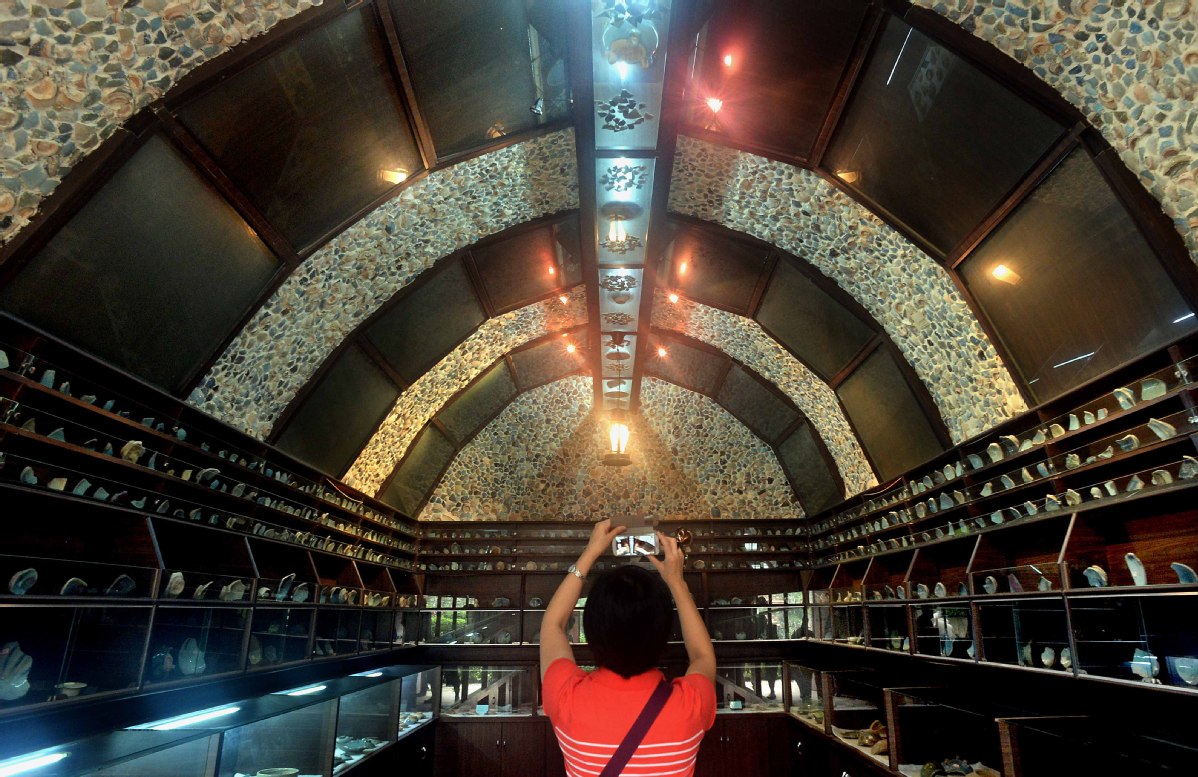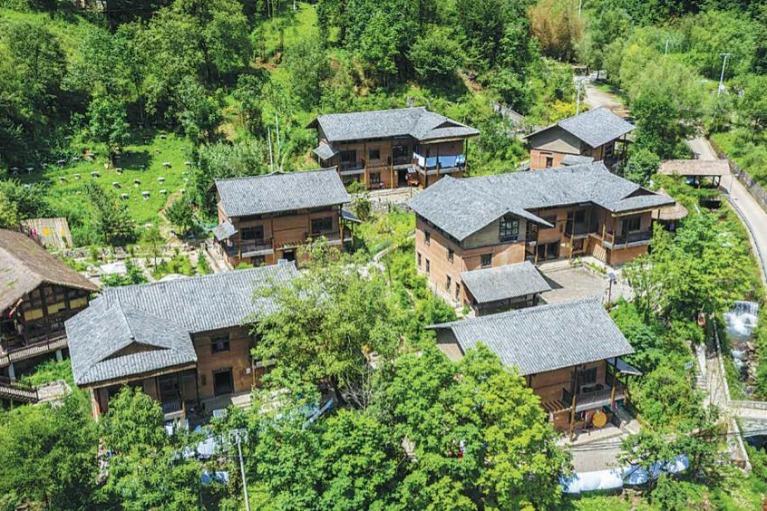Cultural tourism mushrooms in small villages
By Liu Yukun and Shi Baoyin in Xuchang, Henan | China Daily | Updated: 2020-07-07 09:38

Supportive policies in Henan province help local businesses find new growth patterns
Waking up at 7 am, 25-year-old Fan Yupei cleans up, waters flowers in the courtyard and then opens the door of her Jun porcelain production studio, ready for a new day's business.
Life in her hometown of Shenhou, Central China's Henan province, is much slower and happier for Fan, who used to work as a Jun porcelain saleswoman in Beijing for over five years.
"Jun porcelain production is an ancient technique with more than a thousand years' history. Now I want to create something special through combining Jun porcelain production with modern art, and that's the main reason I quit my job in Beijing and started my own studio with my husband in my hometown," Fan said.
Jun porcelain was one of the top five Chinese porcelain styles in the Northern Song Dynasty (960-1127). It is famous for its change of colors when heated in kilns. The rare ceramic ware is now listed as a State-level intangible culture heritage.
Shenhou, where Fan was born and raised, is where Jun porcelain originated. In recent years, the government of Yuzhou city, where Shenhou town is located, has rolled out a series of measures promoting Jun porcelain production, renovating old kilns into stylish houses for visiting and developing tourism based on those resources.
The Yuzhou government has invested a total of 5 billion yuan ($706 million) developing Jun porcelain tourism and related industries.
To date, there are 186 companies engaged in porcelain production in Yuzhou and about 28,000 people work in the industry. The local government said total annual output of such companies had reached 2.4 billion yuan.
"The town still contains old kilns and traditional Chinese houses, but became much prettier than before thanks to government policies. There were a lot of tourists going to Shenhou every day before the coronavirus outbreak. It was very helpful for our business," Fan said.
"Back in Beijing, I made 3,000 yuan per month plus bonuses, but now our studio makes about 150,000 yuan per year in net profit. We just started and I'm confident we can earn more in the future," she said.
Shenhou is not the only town in Henan that benefits from the combination of tourism with local culture. About 416 kilometers away from Shenhou, Tianpudawan, a Xinxian county village whose most buildings are in the ancient Chinese style, is also harnessing its cultural heritage to develop tourism.
The village has stepped up efforts to renovate infrastructure and greening, and has set up 5G signal coverage throughout the area.
It also helped villagers with their hosting and accommodation businesses by offering financial support and other measures. To date, the village has 12 family-run homestay businesses, three agri-tainment centers (a form of entertainment where urban tourists can experience the life of farmers like harvesting crops and fruits, eating and sleeping in farmers' homes), and a sales center that has products associated with local culture.
According to the local government, the village has seen over one million visits and harvested about 85 million yuan in tourism-related revenue last year.
Han Guangying is one of the villagers who benefited from the village's development of tourism. He was once a worker at a shipbuilding company in South Korea, but returned home in 2016, renovated his old house, and opened a homestay business.
"I heard that the local government was planning to develop tourism in my hometown. I thought that was a good opportunity so I came back home. The government offered me nearly 50,000 yuan in subsidies to renovate my old house," Han said.
"I earn roughly 10,000 yuan per month, which is about the same in the past when I worked in the shipbuilding company in South Korea. But now I have more time to take care of my family. In the past, I only got the chance to visit home about once or twice a year," Han added.
Xihewan village, once an impoverished town also located in Xinxian county, is leveraging its cultural heritage to develop tourism as well.
Covered in forests, the village straddles a river and is crowded with ancient Chinese-style houses furnished with modern appliances. Although the village may sound scenic, it was once a grim and messy place.
"You would not believe what it looked like when I first came to the village. Shabby houses and broken walls of pigsty and firewood sheds were everywhere. You could barely see the river because it was all covered with bushes and silt. There wasn't even a phone signal. At that time the whole village only had 39 people, mainly children and the elderly, as most of the adults were working in bigger cities where the pay was much higher," said Zhang Yimou, director of the management committee of Xihewan scenic resort.
Zhang came to Xihewan in 2014. Since then, he started lobbying Xihewan-born adults who had successful businesses in other cities. This included Zhang Sien, who owned a construction company in Beijing. He also lobbied local government departments to improve infrastructure and signal coverage.
From 2014 to date, Xihewan has attracted over 70 million yuan in investment from both companies and the government to improve infrastructure and develop tourism-related businesses.
"With the development of Xihewan, more and more people have come back to their hometown to start businesses like tourism, homestay services, dining, developing local agricultural products and processing and selling goods across the country," Zhang said.
Kuang Jianxin, once a director of technology at Huawei, quit his job in 2017, came back to his hometown Xihewan and started a tea and agricultural products business.
"Xihewan was on a fast track developing tourism. I saw the trend and thought it was a very good opportunity. Many friends did not understand my choice because I already had a decent job with very good pay at that time. I thought if I stayed in Shenzhen, it was very hard for me to make a further breakthrough because there were too many people like me who were professional and talented with their jobs. If I came back, the opportunity was better given Xihewan's rapid development and its demand for talent. Besides, starting a business in my hometown could help more locals with employment," Kuang said.
About a year and half later, Kuang's business in Xihewan has seen nearly 1.3 million yuan in revenue and over 400,000 yuan in profit.
"Our team is developing more healthy farm products and is stepping up efforts in brand building, hoping to have more market influence," Kuang said.
"I hope more efforts will be made to improve education in Xihewan," Kuang said. His wife and child are still living in Shenzhen for better education, and Kuang has to travel between the two places constantly.
For investors, discovering unique resources and developing them into tourism-related businesses like homestays and accommodation services might be a good choice because they require relatively small investment and low costs but might bring considerable returns, said Zhou Minliang, a senior researcher at the Institute of Industrial Economics of the Chinese Academy of Social Sciences.
"In general, leveraging cultural and historical resources that are unique to certain places and developing tourism and related businesses based on the resources is an effective way to create more job opportunities in those places and boost the local economy."
"Furthermore, harnessing cultural and geographical resources helps with poverty alleviation in less-developed areas, reduces the gap between villages, counties, and cities and promotes a more balanced and sustainable development of the whole area," Zhou said.
China has been on a fast track promoting counties with characteristics as a part of its concerted effort to boost the regional economy, Zhou said.
"But there are also many problems, like blindly building theme parks and shopping galas that are all alike, or turning tourism-related businesses into real estate projects. Going forward, villages and counties like Xihewan and Tianpudawan can cooperate with institutes and universities, as well as companies, to leverage various sources for better development," Zhou added.
























